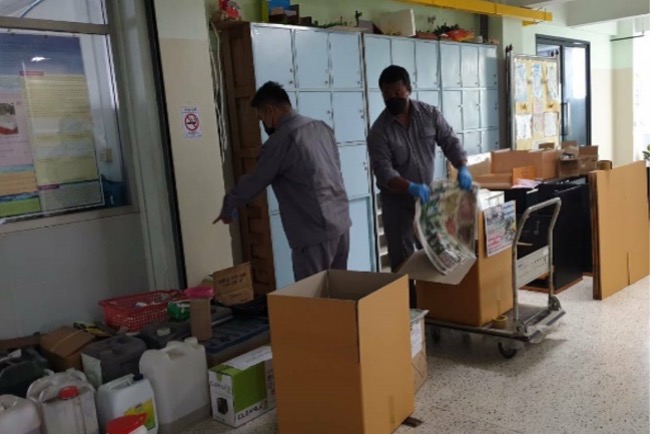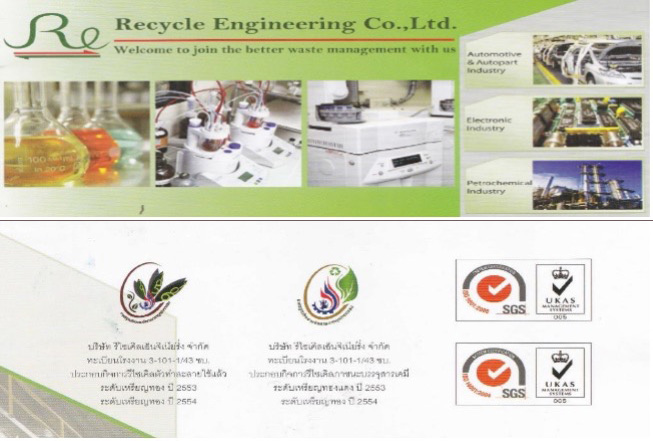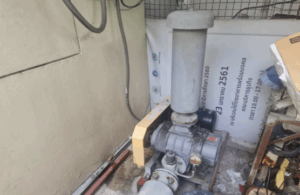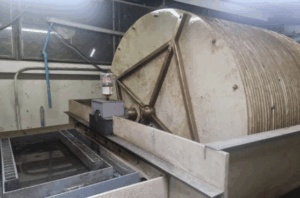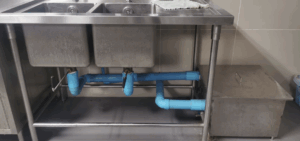Waste (WS)
Table of contents
Toxic Waste Treatment
Description:
As outlined in Section 3.16, toxic waste at Rajamangala University of Technology Phra Nakhon (RMUTP)—including electronic equipment, laboratory chemicals, and batteries—is managed through specific treatment processes to ensure environmental and health safety. Laboratory chemical waste is primarily managed by classifying the materials and transferring them to a certified hazardous waste company, Recycle Engineering Co., Ltd., for proper treatment and disposal.
In parallel, electronic equipment and battery waste are collected and treated through both Recycle Engineering Co., Ltd. and the municipal treatment center. In this context, the university reports only the toxic waste that is managed by the certified company, which totals 1.3 tons—representing 69.15% of the 1.88 tons of toxic waste generated across all campuses.
Additional evidence link (i.e., for videos, more images, or other files that are not included in this file):
https://green.rmutp.ac.th/sustainability-report/
Sewage disposal
Preliminary sewage treatment (Rajamangala University of Technology Phra Nakhon, Thailand)
Description:
Rajamangala University of Technology Phra Nakhon recognizes the environmental challenges posed by wastewater and their potential impacts on the health and well-being of students and staff across all campuses. A significant portion of this wastewater originates from restroom facilities, instructional kitchens used in practical cooking courses, and cafeteria eateries. Notably, grease, oil residues, and food scraps from cafeteria operations contribute to a substantial share of wastewater contamination.
To address these issues, the university has implemented a preliminary but structured wastewater treatment system aimed at reducing the environmental impact of sewage disposal. This system comprises three key components:
Rotating Disc Wastewater Treatment: Uses rotating discs to enhance biological treatment by promoting the growth of microorganisms that break down organic matter.
Aerated Wastewater Treatment: Introduces air into the wastewater to support aerobic bacteria in decomposing organic pollutants, thereby improving effluent quality.
Grease Traps and Food Waste Filters: Capture fats, oils, and food particles before further processing, preventing blockages and reducing contamination.
While these systems play an important role in initial treatment and pollution load reduction, the university ultimately relies on the municipal sewage system for comprehensive treatment and safe disposal. This collaboration helps ensure that all wastewater discharged from the university meets environmental safety standards and does not harm the surrounding community.
The university remains committed to continually enhancing its wastewater management practices to further reduce environmental impacts and safeguard the health and well-being of the campus community.
Additional evidence link (i.e., for videos, more images, or other files that are not included in this file):
https://green.rmutp.ac.th/sustainability-report/
Waste ICT
Planning, implementation, monitoring and/or evaluation of all programs related to Waste Management through the utilization of Information and Communication Technology (ICT)
Description:
Rajamangala University of Technology Phra Nakhon has not yet implemented information and communication technology (ICT) in its waste management practices, as the program is currently in the planning and development stage. The absence of technological integration at this stage limits the university’s ability to optimize waste management processes, improve operational efficiency, and enhance data collection and analysis related to waste generation and disposal.
The planned adoption of ICT solutions is expected to provide advanced monitoring systems, real-time data tracking, and improved communication among stakeholders involved in waste management. Once implemented, these technologies will support more sustainable practices and align the university with global trends in modern environmental management.
Recognizing the potential benefits, the university is actively studying and designing an ICT-based waste management framework to be rolled out in the near future as part of its commitment to sustainability and operational improvement.
Additional evidence link (i.e., for videos, more images, or other files that are not included in this file):
https://green.rmutp.ac.th/sustainability-report/
Impact of Waste Management programs in supporting the Sustainable Development Goals (SDGs)
Description:
Rajamangala University of Technology Phra Nakhon (RMUTP) has developed a wide range of Waste Management (WS) programs that directly support multiple dimensions of sustainable development. These programs go beyond basic collection and disposal by actively promoting waste reduction, reuse, recycling, safe treatment, and stakeholder education, thereby aligning with several key UN Sustainable Development Goals (SDGs).
- Program Scope and Activities
RMUTP’s WS initiatives include:
- Waste reduction and resource efficiency: Policies to minimize printed paper use, promote electronic documentation, and encourage reusable personal containers, bottles, and cloth bags.
- Recycling and material recovery: Segregation and collection of plastic bottles, hard paper, glass, and metal cans for recycling by certified local vendors.
- Organic waste recycling: Collection of leftover food from the North Bangkok Campus cafeteria for reuse as animal feed, diverting a significant portion of organic waste from landfills.
- Toxic waste management: Proper classification, secure storage, and certified treatment of laboratory chemicals, electronic waste, and used batteries, ensuring safe disposal and reducing pollution risks.
- Wastewater pre-treatment: Use of rotating disc systems, aeration processes, and grease traps to reduce contaminants before discharge to the municipal sewage system.
- Awareness and behavioral change: Training, signage, and campaigns that promote responsible consumption and proper waste sorting among staff, students, and food stall operators.
- Planned ICT integration: Development of an ICT-based waste tracking system to improve data-driven decision-making and operational efficiency (currently in the planning phase).
- SDGs Directly Supported
These programs directly support at least 6–9 SDGs, specifically:
- SDG 3 – Good Health and Well-Being: By reducing exposure to hazardous materials and improving campus sanitation.
- SDG 6 – Clean Water and Sanitation: Through wastewater pre-treatment systems that protect water quality.
- SDG 11 – Sustainable Cities and Communities: By improving solid waste infrastructure and reducing landfill burden.
- SDG 12 – Responsible Consumption and Production: Through systematic waste reduction, recycling, and reuse practices.
- SDG 13 – Climate Action: By reducing waste sent to landfills and associated greenhouse gas emissions.
- SDG 14 – Life Below Water & SDG 15 – Life on Land: By preventing plastic leakage and hazardous chemical contamination that threaten ecosystems.
This shows that the WS programs are not isolated efforts but integrated sustainability measures that benefit the environment, public health, and the broader community.
- Justification of Impact Level
Considering the breadth (multiple waste types), depth (end-to-end management from source to treatment), and cross-cutting benefits (health, environmental, and social) of RMUTP’s WS programs, they clearly contribute to at least six SDGs.
- Future Commitment
RMUTP is committed to expanding these programs by:
- Scaling up recycling infrastructure,
- Integrating ICT-based monitoring systems,
- Increasing stakeholder participation, and
- Setting measurable targets aligned with the UN SDGs.
These actions will continue to strengthen the university’s contribution to sustainable development and may elevate the impact level in future assessments.
Additional evidence link (i.e., for videos, more images, or other files that are not included in this file):
https://green.rmutp.ac.th/sustainability-report/

